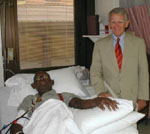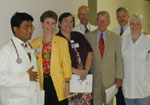Medicare may help those with kidney ailments
by Michael BakerPublic Relations
New legislation concerning Medicare reform could give significant financial aid to health care centers and patients with kidney ailments.
Part of the legislation would modernize Medicare’s payment system for people with end stage renal disease who must undergo continuous dialysis treatments.
In the current system, Medicare reimburses dialysis providers by paying 80 percent of a predetermined average cost of the dialysis treatments—this percentage is called the “composite rate.” The dialysis patient pays the remaining 20 percent of the medical bills that Medicare does not cover.
According to reform advocates, however, there are two glaring problems with the current system of reimbursement. First, the composite rate was determined in 1983, and only a few one-time adjustments have been made since the rate’s inception. No adjustments have been made to keep the system updated on a yearly basis.
So while inflation and input prices—and with them the overall cost of dialysis—have risen in the past 20 years, health care providers still receive payments that were mandated in the early 80s.
The new legislation calls for the composite rate to increase by 1.6 percent in each of the subsequent four years, thus lessening the burden on dialysis providers.
The second pitfall of the current payment system lies in its reliance on co-payments from dialysis patients, said MUSC nephrology research coordinator Deborah Brooks, R.N. Brooks, a certified nephrology nurse and adult nurse practitioner, and American Nephrology Nurses' Association member, a group which has been working to educate legislators and the public about the renal portion of the Medicare bill.
 Charleston
Mayor Joe Riley visits MUSC patient Meyers Bishop during End Stage Renal
Disease Education Day, Aug. 15.
Charleston
Mayor Joe Riley visits MUSC patient Meyers Bishop during End Stage Renal
Disease Education Day, Aug. 15.
“Patients who don’t have the funding to pay for their medical bills can really put dialysis facilities in a bind,” Brooks said. “After a partial or non-payment, these facilities have no choice but to absorb the unpaid bills at their own expense.”
Opposition to the new legislation points out that the issue of patient non-payment can apply to all ailments, not just chronic kidney disease. However, Brooks pointed out that this argument still doesn’t resolve the issue of archaic composite rates.
“The South has one of the higher incidences of end stage renal disease in the nation,” she said, “so it is important for dialysis facilities to have an appropriate reimbursement system in place in order to serve the public.”
Currently, there are 90 dialysis units in South Carolina, totaling about 1,800 chairs for patients to use. Each dialysis chair can be used twice a day, and with modern dialysis scheduling, about 7,200 people can receive treatment each week.
Brooks said the number of dialysis patients in South Carolina alone shows that health care for end stage renal disease is an important issue and that it could become an even larger problem if the payment system isn’t rectified.
“Of more than 400,000 dialysis patients in the country, 10 percent live in South Carolina, Georgia, and North Carolina,” Brooks said. These high numbers suggest the need for more facilities, but limited finances have made expansion difficult.
According to Kidney Care Partners—an alliance of patient advocates, medical professionals, and dialysis providers—dialysis centers “cannot afford to compete for nurses and other professionals with health care providers that have annual update systems.” Moreover, nurses are increasingly vacating their positions at dialysis centers for jobs with better wages.
Opponents of the legislation have also questioned whether separately billed kidney medications could actually make up for the payment discrepancies in dialysis treatment. But Kidney Care Partners maintains that the financial gain from these extra medications only balances out the debt and, as dialysis costs continue to increase, the added benefit from separately billed medications sometimes fails to help the providers break even.
Still, the rising cost of kidney dialysis should come as no surprise, given the intricate functions of the kidney and the complicated nature of dialysis.
Kidneys cleanse the body by removing waste products from the bloodstream and by producing urine. They also produce a hormone, erythropoietin, that aids bone marrow in producing red blood cells. Red blood cells contain a protein that carries oxygen throughout the body.
 End
Stage Renal Disease Education Day participants are from left: Dr. Kedar
Shetye, Deborah Brooks, R.N., Nancy Davidson, R.N., Dr. David Ploth, Mayor
Joe Riley, Dr. Jack Feussner, and Nancy Black, R.N.
End
Stage Renal Disease Education Day participants are from left: Dr. Kedar
Shetye, Deborah Brooks, R.N., Nancy Davidson, R.N., Dr. David Ploth, Mayor
Joe Riley, Dr. Jack Feussner, and Nancy Black, R.N.
When the kidneys fail, as they inevitably do in people with end stage renal disease, the body falls ill for two reasons. First, the kidneys no longer remove waste from the body, and toxins build up instead of being expelled. Also, the bone marrow produces fewer and fewer red blood cells, and the body receives less oxygen than it needs to function normally, which can lead to anemia.
Kidney failure is always fatal unless treated, which is why dialysis or a kidney transplant is necessary.
During a typical dialysis treatment, the patient’s blood is circulated outside the body through a dialyzer. The dialyzer acts as an artificial kidney, processing and filtering waste from the bloodstream before circulating the blood back into the patient. Each treatment lasts three to four hours and must be scheduled three times per week.
As important as dialysis is to those who require it, the enduring goal of health care providers is to keep people with chronic kidney disease off of dialysis completely.
With that in mind, another part of the new legislation hopes to form educational programs that would teach methods of preventing or prolonging kidney failure to people who are at risk.
Many people don’t realize that kidney failure doesn’t occur merely by happenstance, especially in the South. Brooks said that it’s quite common to find families who have numerous members undergoing dialysis treatments.
In a recent study, hypertension and diabetes—two perennially prominent health issues in South Carolina—were responsible for 67 percent of end stage renal disease cases at MUSC.
Because so many people can be considered at risk of chronic kidney disease, Brooks stressed that prevention is as important as adequate dialysis facilities.
“Ideally, we don’t want people to even be in a situation where they need dialysis,” she said, “and we’ve seen what a difference it makes to have people who are aware of the risks, who are on medication and not dialysis.”
Brooks added that even if kidney failure is inevitable, proper medication and education can teach people how to stay healthy, which can extend the life of their kidneys before failure occurs.
For now, advocates and opponents will have to wait for a decision.
The Medicare Reform bill awaits a decision from a Senate/House Conference Committee, although it is unknown when a final version of the bill will pass. Nevertheless, reform can’t come quickly enough for dialysis providers and patients.
“More than 1.5 million people in the United States have some degree
of kidney disease and don’t even know about it,” Brooks said, “but they
need to know about it. Proper facilities and educational programs are easily
preferable to winding up in the emergency room.”
Catalyst Online is published weekly, updated as
needed and improved from time to time by the MUSC Office of Public Relations
for the faculty, employees and students of the Medical University of South
Carolina. Catalyst Online editor, Kim Draughn, can be reached at 792-4107
or by email, catalyst@musc.edu. Editorial copy can be submitted to Catalyst
Online and to The Catalyst in print by fax, 792-6723, or by email to petersnd@musc.edu
or catalyst@musc.edu. To place an ad in The Catalyst hardcopy, call Community
Press at 849-1778.